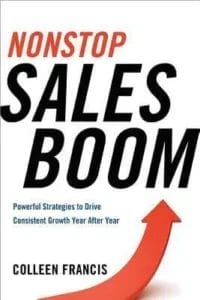 Stacking a sales team with great talent is one of the toughest jobs a sales manager will face. The constant pressure to meet immediate goals creates a natural barrier to being patient and waiting for the right person. Participating in a discussion on LinkedIn recently reminded me that many sales managers don’t believe that great sales people even exist, and that, as a result, recruiting should be pushed down their priority list.
Stacking a sales team with great talent is one of the toughest jobs a sales manager will face. The constant pressure to meet immediate goals creates a natural barrier to being patient and waiting for the right person. Participating in a discussion on LinkedIn recently reminded me that many sales managers don’t believe that great sales people even exist, and that, as a result, recruiting should be pushed down their priority list.
Running to Stand Still
In my early days as a sales manager, selling large enterprise level web content management solutions for GlobalX back in the mid 90’s, we worked our butts off to compete with very well financed start-ups such as Vignette, Opentext and Interwoven. My team had a mixed bag of reps – some at and some below targets, but I spent a lot of my time managing some under-performing reps on my team and trying to train them to be better. Some days I was helping my reps focus, other days it was helping them create account plans and sometimes it was literally helping them write properly. The time I invested in these reps usually didn’t translate to better sales numbers and because I didn’t know any better at the time, I wondered if I was simply a poor manager, not able to inspire the right results in my team.
I probably wasn’t much of a sales manager, but the point I am trying to make is that I really had no clear idea whether the problem was me or my reps. Looking back, it is clear to me now that it was a combination of both, but I had not set myself up to succeed because I had not been careful to hire sales success DNA onto my team.
Naively, not only did I not realize hiring sales talent was a priority, but I also didn’t realize that hiring great sales people was an option. Whenever we tried to hire someone, we seemed to attract a certain caliber of sales people applying for our positions – either journeymen who were out of work and had no choice, but to accept the risk of a start-up, or hot shots who knew the Internet (a key thing in the early days) but who had no track record of success. For me, it seemed replacing the weaker sales reps I had would only result in hiring the same types over again and bring about the same poor performance and management challenges.
What I didn’t realize at the time was that my refusal to be proactive about sales hiring was taking a huge toll on our sales numbers.
Reactive Sales Hiring is Painful
At any point in time, there will always be a percentage of reps on any team that are missing their targets. Even on the best teams there are typically 20% of reps below target. In some companies the number is much higher. In any event, a savvy sales manager expects this and factors this into their sales projections, but what do they do about reps that are consistently missing targets? My approach has always been to try all ways to motivate the employee to get better before cutting bait. I would rather develop a sales person I already have on my team and know than invest the big effort in finding a new one. But at a certain point, if I can’t motivate the right behaviours and results then I will accept that we aren’t meant to be together and I’ll trigger a separation.
It makes little sense to spend the time and money training and developing your sales team when the people in whom you are investing do not have the capability for sustainable improvement. ….“Mishiring” is an epidemic. Depending on the industry, ESR estimates that somewhere between 20 and 33 percent of salespeople do not have the capabilities to be successful at their jobs. Investing in sales processes, training, attractive incentive plans, technology, marketing support and strong products and services to sell will not do much unless you have a team of qualified sales professionals with the right attributes. (Check out Dave Stein’s article If You Want Sales Training to Work, Get the Right People on the Team)
Avoiding Inevitable Change
Too infrequently in practice, is the “hire slow, fire fast” philosophy followed. Many sales managers will hang on to reps long past the point where it is time to let go. Sales people are an optimistic bunch, so in some cases there may be honest hope to turn things around, but hope is not a good strategy. If a rep is consistently mediocre or worse, the pressure to make a change will mount over time until eventually making a change is unavoidable.
When a performance problem has been permitted to persist for a long time, ultimately forcing a rep to be released from their employment, the sales manager is often more desperate than ever to find a replacement who can generate much needed sales ASAP.
You can’t train employees to be great people. Hire great people. And they’ll take care of your customers. It’s that simple.” Cameron Herold – You Can’t Train Employees to Be Great
Proactive Sales Hiring
Going back to my own early experiences in sales management, I will admit that I placed a low priority on sales recruiting, treating it like a fire that needed to be fought every now and then. I was conditioned to expect poor results and also felt that the level of effort was out of line with the return.
Hiring great sales people is an arduous process. First you have to get exposed to the right people, which requires effort since they are working and not looking at or responding to job ads. Secondly, you have to convince the sales person that what your company offers is better than what they currently have, and you will have to deal with some skepticism. Thirdly, you have to deal with the reality that some have non-competes, and lastly you have to wait while they resign from their current employer which may involve a long termination period, handoffs, staying to collect quarterly bonuses and/or closing maturing deals. This all takes time and time is something the sales manager who needs to make a quick hire does not have. Simply put, if you have to make an immediate hire, then hiring the best sales people is going to be a frustrating experience.
That is to say, recruiting great sales people will be frustrating if you have to hire quickly unless, you have established a system for attracting sales talent even when you are not hiring. Such a system needs to include ways to get the attention of high achieving sales sales people, passive candidates, who are actively working for other employers. Most of the things you do to attract top sales talent are also the same things you do to attract great customers:
- Becoming known as en employer of choice
- Great PR
- Direct recruiting
- Hiring a specialized recruiter to target top sales talent
- Network
- Maintain a great online presence (see our post Does Your Company’s Online Reputation Matter When Sales Recruiting?)
- Give speeches
Sales Recruiting as a Top Priority
If attracting strong sales people is a primary driver of sales success (which most experts agree), then shouldn’t recruiting be a top priority?
As I gained experience as a sales manager, I came to realize that by hiring a better breed of sales people, I would spend less time managing in the weeds, and could more effortlessly deliver my numbers. But this took effort. It takes a commitment to hiring and regular investment in attracting the right people to sales team. In my case, that meant it was on my list of things to work on every week and we worked hard to address the areas mentioned above to attract great sales talent.
What amount of attention to sales recruiting is the right amount? When I recently asked the EVP of sales in a national telecomm company, he told me that he spends 90% of his time working on deals contributing to the current quarter’s goals and 10% of his time on strategy and future planning which includes sales recruiting.
Sales expert Colleen Francis, on the other hand, is more explicit about the priority of hiring on the sales manager’s list of responsibilities:
You say it to your sales team all the time: “ABC. Always Be Closing.” Well, as a sales leader, I’d recommend that you adopt a slightly different mantra for yourself: ABR: Always Be Recruiting. Many sales managers settle into complacency when their team is performing well, or recruiting falls by the wayside when there’s too much else on their plates. But in reality, it’s essential to constantly have recruiting on your to-do list.” Recruiting Great Sales People
The right answer probably has a lot to do with your company’s programs to attract talent. A large, established company is likely to have the profile to attract a steady stream of job applicants and an HR department actively working to recruit on behalf of the sales manager, while a sales manager in a smaller company may have to do the recruiting themselves and should be on the lookout for good sales people 24/7.
In either case, if a sales manager doesn’t make sales recruiting a top priority, then they are likely be disappointed with the quality of sales hires they are able to make. And a sales manager that cannot consistently attract great sales people is unlikely to be able to consistently deliver great results.
To your success!
Photo Credit: nocas via Compfight cc
Running to Stand Still
In my early days as a sales manager, selling large enterprise level web content management solutions for GlobalX back in the mid 90’s, we worked our butts off to compete with very well financed start-ups such as Vignette, Opentext and Interwoven. My team had a mixed bag of reps – some at and some below targets, but I spent a lot of my time managing some under-performing reps on my team and trying to train them to be better. Some days I was helping my reps focus, other days it was helping them create account plans and sometimes it was literally helping them write properly. The time I invested in these reps usually didn’t translate to better sales numbers and because I didn’t know any better at the time, I wondered if I was simply a poor manager, not able to inspire the right results in my team.
I probably wasn’t much of a sales manager, but the point I am trying to make is that I really had no clear idea whether the problem was me or my reps. Looking back, it is clear to me now that it was a combination of both, but I had not set myself up to succeed because I had not been careful to hire sales success DNA onto my team.
Naively, not only did I not realize hiring sales talent was a priority, but I also didn’t realize that hiring great sales people was an option. Whenever we tried to hire someone, we seemed to attract a certain caliber of sales people applying for our positions – either journeymen who were out of work and had no choice, but to accept the risk of a start-up, or hot shots who knew the Internet (a key thing in the early days) but who had no track record of success. For me, it seemed replacing the weaker sales reps I had would only result in hiring the same types over again and bring about the same poor performance and management challenges.
What I didn’t realize at the time was that my refusal to be proactive about sales hiring was taking a huge toll on our sales numbers.
Reactive Sales Hiring is Painful
At any point in time, there will always be a percentage of reps on any team that are missing their targets. Even on the best teams there are typically 20% of reps below target. In some companies the number is much higher. In any event, a savvy sales manager expects this and factors this into their sales projections, but what do they do about reps that are consistently missing targets? My approach has always been to try all ways to motivate the employee to get better before cutting bait. I would rather develop a sales person I already have on my team and know than invest the big effort in finding a new one. But at a certain point, if I can’t motivate the right behaviours and results then I will accept that we aren’t meant to be together and I’ll trigger a separation.
It makes little sense to spend the time and money training and developing your sales team when the people in whom you are investing do not have the capability for sustainable improvement. ….“Mishiring” is an epidemic. Depending on the industry, ESR estimates that somewhere between 20 and 33 percent of salespeople do not have the capabilities to be successful at their jobs. Investing in sales processes, training, attractive incentive plans, technology, marketing support and strong products and services to sell will not do much unless you have a team of qualified sales professionals with the right attributes. (Check out Dave Stein’s article If You Want Sales Training to Work, Get the Right People on the Team)
Avoiding Inevitable Change
Too infrequently in practice, is the “hire slow, fire fast” philosophy followed. Many sales managers will hang on to reps long past the point where it is time to let go. Sales people are an optimistic bunch, so in some cases there may be honest hope to turn things around, but hope is not a good strategy. If a rep is consistently mediocre or worse, the pressure to make a change will mount over time until eventually making a change is unavoidable.
When a performance problem has been permitted to persist for a long time, ultimately forcing a rep to be released from their employment, the sales manager is often more desperate than ever to find a replacement who can generate much needed sales ASAP.
“You can’t train employees to be great people. Hire great people. And they’ll take care of your customers. It’s that simple.” Cameron Herold – You Can’t Train Employees to Be Great
Proactive Sales Hiring
Going back to my own early experiences in sales management, I will admit that I placed a low priority on sales recruiting, treating it like a fire that needed to be fought every now and then. I was conditioned to expect poor results and also felt that the level of effort was out of line with the return.
Hiring great sales people is an arduous process. First you have to get exposed to the right people, which requires effort since they are working and not looking at or responding to job ads. Secondly, you have to convince the sales person that what your company offers is better than what they currently have, and you will have to deal with some skepticism. Thirdly, you have to deal with the reality that some have non-competes, and lastly you have to wait while they resign from their current employer which may involve a long termination period, handoffs, staying to collect quarterly bonuses and/or closing maturing deals. This all takes time and time is something the sales manager who needs to make a quick hire does not have. Simply put, if you have to make an immediate hire, then hiring the best sales people is going to be a frustrating experience.
That is to say, recruiting great sales people will be frustrating if you have to hire quickly unless, you have established a system for attracting sales talent even when you are not hiring. Such a system needs to include ways to get the attention of high achieving sales sales people, passive candidates, who are actively working for other employers. Most of the things you do to attract top sales talent are also the same things you do to attract great customers:
- Becoming known as en employer of choice
- Great PR
- Direct recruiting
- Hiring a specialized recruiter to target top sales talent
- Network
- Maintain a great online presence (see our post Does Your Company’s Online Reputation Matter When Sales Recruiting?)
- Give speeches
Sales Recruiting as a Top Priority
If attracting strong sales people is a primary driver of sales success (which most experts agree), then shouldn’t recruiting be a top priority?
As I gained experience as a sales manager, I came to realize that by hiring a better breed of sales people, I would spend less time managing in the weeds, and could more effortlessly deliver my numbers. But this took effort. It takes a commitment to hiring and regular investment in attracting the right people to sales team. In my case, that meant it was on my list of things to work on every week and we worked hard to address the areas mentioned above to attract great sales talent.
What amount of attention to sales recruiting is the right amount? When I recently asked the EVP of sales in a national telecomm company, he told me that he spends 90% of his time working on deals contributing to the current quarter’s goals and 10% of his time on strategy and future planning which includes sales recruiting.
Sales expert Colleen Francis, on the other hand, is more explicit about the priority of hiring on the sales manager’s list of responsibilities:
“You say it to your sales team all the time: “ABC. Always Be Closing.” Well, as a sales leader, I’d recommend that you adopt a slightly different mantra for yourself: ABR: Always Be Recruiting. Many sales managers settle into complacency when their team is performing well, or recruiting falls by the wayside when there’s too much else on their plates. But in reality, it’s essential to constantly have recruiting on your to-do list.” Recruiting Great Sales People
The right answer probably has a lot to do with your company’s programs to attract talent. A large, established company is likely to have the profile to attract a steady stream of job applicants and an HR department actively working to recruit on behalf of the sales manager, while a sales manager in a smaller company may have to do the recruiting themselves and should be on the lookout for good sales people 24/7.
In either case, if a sales manager doesn’t make sales recruiting a top priority, then they are likely be disappointed with the quality of sales hires they are able to make. And a sales manager that cannot consistently attract great sales people is unlikely to be able to consistently deliver great results.
To your success!
Photo Credit: nocas via Compfight cc
relpost-thumb-wrapper
Related posts
close relpost-thumb-wrapper
Eliot Burdett
He co-authored Sales Recruiting 2.0, How to Find Top Performing Sales People, Fast and provides regular insights on sales team management and hiring on the Peak Sales Recruiting Blog.
Latest posts by Eliot Burdett (see all)
- 20 Of Our Favorite Books About Sales Management and Sales Leadership – October 20, 2023
- How To Make Progress On Your Sales Goal Without A Sales Leader – September 15, 2021
- Augment Your Recruiting Strategy During “The Great Resignation” – July 26, 2021










